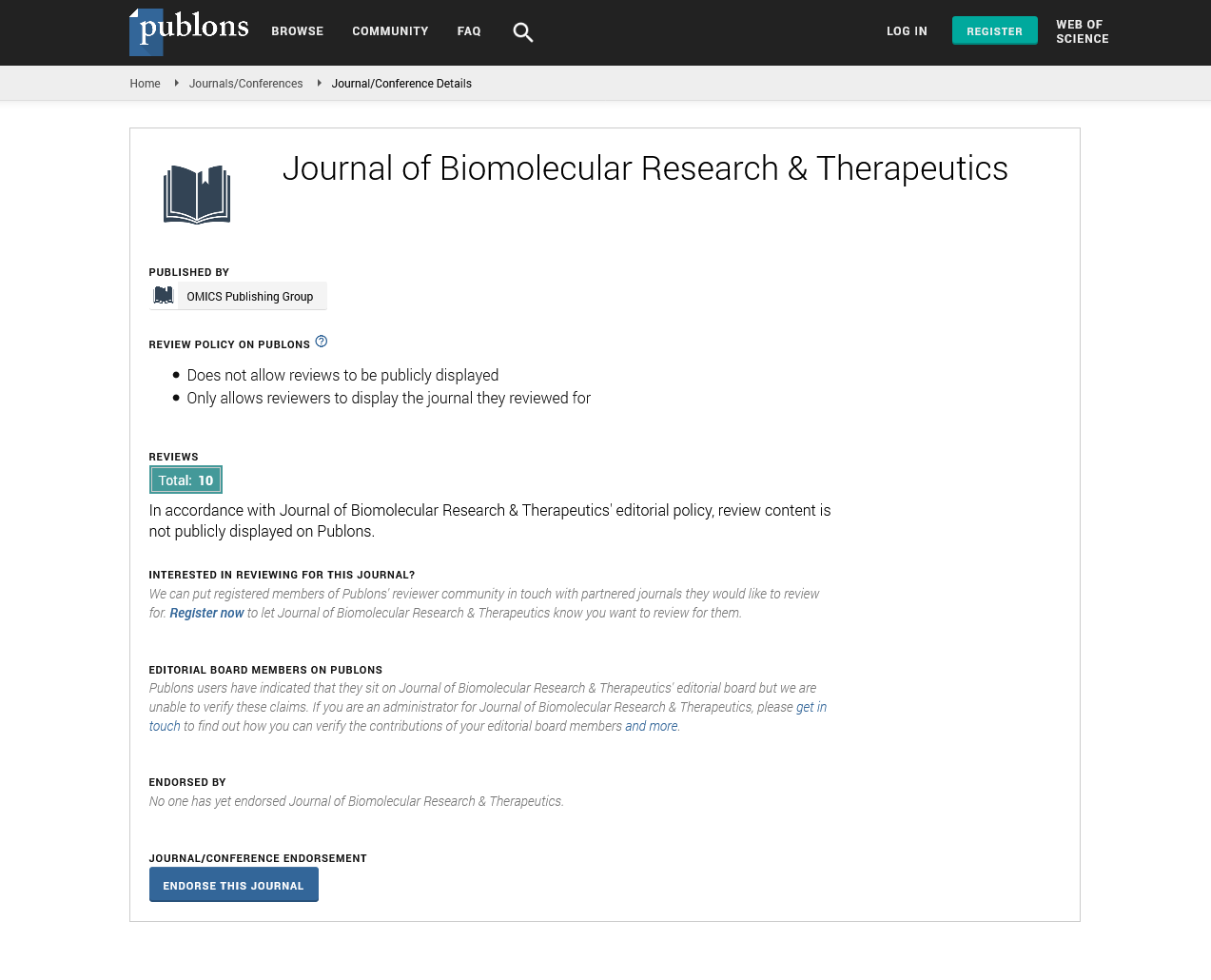Indexed In
- Open J Gate
- Genamics JournalSeek
- ResearchBible
- Electronic Journals Library
- RefSeek
- Hamdard University
- EBSCO A-Z
- OCLC- WorldCat
- SWB online catalog
- Virtual Library of Biology (vifabio)
- Publons
- Euro Pub
- Google Scholar
Useful Links
Share This Page
Journal Flyer

Open Access Journals
- Agri and Aquaculture
- Biochemistry
- Bioinformatics & Systems Biology
- Business & Management
- Chemistry
- Clinical Sciences
- Engineering
- Food & Nutrition
- General Science
- Genetics & Molecular Biology
- Immunology & Microbiology
- Medical Sciences
- Neuroscience & Psychology
- Nursing & Health Care
- Pharmaceutical Sciences
Perspective - (2025) Volume 14, Issue 2
Epigenetic Modifications as Targets in Disease Treatment
Oliver Schmidt*Received: 28-Mar-2025, Manuscript No. BOM-25-29591; Editor assigned: 31-Mar-2025, Pre QC No. BOM-25-29591; Reviewed: 14-Apr-2025, QC No. BOM-25-29591; Revised: 19-Apr-2025, Manuscript No. BOM-25-29591; Published: 28-Apr-2025, DOI: 10.35248/2167-7956.25.14.434
Description
Epigenetics refers to heritable changes in gene expression that occur without alterations in DNA sequence. These modifications include DNA methylation, histone modification and non-coding RNA regulation, all of which influence cellular behavior. Epigenetic mechanisms play critical roles in development, differentiation and disease progression, making them attractive targets for therapeutic intervention. In cancer, epigenetic dysregulation contributes to uncontrolled growth, resistance to apoptosis and metastasis. Aberrant DNA methylation patterns often silence tumor suppressor genes, while histone modifications alter chromatin structure and gene accessibility. Drugs that reverse these changes, such as DNA methyl transferase inhibitors and histone deacetylase inhibitors, have been developed and are used clinically to treat certain hematological malignancies.
Epigenetic therapies are also being explored in non-cancer diseases. In neurological disorders, abnormal histone acetylation has been linked to impaired memory and learning. Research is investigating whether epigenetic drugs can restore cognitive function in conditions such as Alzheimer’s disease and Huntington’s disease. Similarly, in metabolic disorders, epigenetic changes in key regulatory genes contribute to obesity and type 2 diabetes, highlighting new therapeutic possibilities.
One advantage of epigenetic therapies is their potential reversibility. Unlike genetic mutations, epigenetic modifications can often be reversed or modulated through chemical agents. This opens opportunities for dynamic regulation of disease-associated genes. However, achieving specificity remains a challenge, as epigenetic modifications are widespread and context-dependent. Off-target effects and systemic toxicity must be carefully managed in clinical applications.
Advances in next-generation sequencing and bioinformatics have enabled comprehensive mapping of epigenetic landscapes in health and disease. These insights facilitate the identification of disease-specific patterns and guide drug development. Integration of epigenetic biomarkers into diagnostics is also expanding, providing tools for early detection and monitoring of therapeutic response. Novel strategies are being developed to improve the precision of epigenetic therapies. CRISPR-based epigenome editing tools allow targeted modification of specific genes without altering DNA sequence. By fusing epigenetic regulators to CRISPR components, researchers can activate or silence genes with unprecedented accuracy, opening new avenues for personalized medicine.
Beyond therapy, epigenetics is reshaping our understanding of disease origins. Environmental exposures, such as stress, pollutants and diet, can induce epigenetic changes that persist across generations a concept known as transgenerational epigenetic inheritance. This has important implications for public health, as it links environmental conditions to disease risk in future generations. Moreover, the concept of epigenetic plasticity offers hope for regenerative medicine. By reprogramming somatic cells using epigenetic tools, scientists are exploring ways to induce stem-cell-like properties, potentially enabling tissue regeneration and repair in degenerative diseases.
As the field advances, clinical translation remains a key hurdle. Many epigenetic drugs are still in early-stage trials and their efficacy in solid tumors and chronic conditions is yet to be fully realized. Combination therapies, where epigenetic agents are used alongside immunotherapy or chemotherapy, are under investigation to improve outcomes.
An emerging area of interest is epigenetic immunomodulation, where therapies are designed to modify immune cell behavior through epigenetic reprogramming. This strategy holds promise in boosting immune responses against cancer and chronic infections by enhancing the activity of T cells and natural killer cells. Additionally, liquid biopsy-based epigenetic assays are being developed to detect cancer at early stages using circulating tumor DNA with specific methylation signatures. These noninvasive diagnostics offer real-time monitoring and personalized treatment adjustments. As tools and technologies become more refined, epigenetic medicine is poised to revolutionize precision healthcare, offering hope for treating complex and previously intractable diseases.
As epigenetic profiling becomes more accessible, patient stratification based on individual epigenomic signatures is gaining importance. Tailoring therapies to a patient’s unique epigenetic makeup not only increases therapeutic efficacy but also minimizes side effects. Furthermore, the integration of Artificial Intelligence (AI) and machine learning is accelerating epigenetic drug discovery by predicting functional epigenetic targets and optimizing compound design.
Despite these advances, long-term effects and durability of epigenetic interventions need continued investigation through robust clinical trials. Ethical considerations are also emerging, particularly in germline epigenetic editing, which could have implications for future generations. As we push the boundaries of therapeutic epigenetics, the establishment of clear regulatory frameworks will be essential to govern safety, consent and equitable access to emerging treatments. Public awareness and education must also accompany scientific progress to foster informed decision-making and address societal concerns. Additionally, epigenetic therapies in pediatric and prenatal contexts require special ethical scrutiny, given their potential to affect developmental pathways. Continued multidisciplinary research will be critical to safely harness the full therapeutic potential of epigenetic science.
Citation: Schmidt O (2025). Epigenetic Modifications as Targets in Disease Treatment. 14.434
Copyright: © 2025 Schmidt O. This is an open access article distributed under the terms of the Creative Commons Attribution License, which permits unrestricted use, distribution and reproduction in any medium, provided the original author and source are credited

